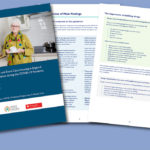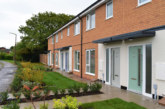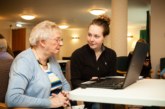A groundbreaking research project into the response to the COVID-19 pandemic has revealed how Retirement Village and Extra Care Housing operators helped to protect the lives of their residents and staff.
The RE-COV study was led by the St Monica Trust, funded by the Dunhill Medical Trust and supported by the Housing LIN. The aim of the research project was to better understand the experiences of retirement villages and extra care housing during the pandemic, including the effectiveness of measures taken to protect the health and well-being of residents and staff.
Findings showed that Retirement Village and Extra Care Housing scheme operators in England were successful in protecting and supporting their residents during the pandemic. In particular, this was evidenced by:
- The overall lower than expected proportion of RE-COV survey participants’ residents who died from COVID-19 in comparison to people with the same age profile living in the general population in England.
- The positive effects of the lengths that operators and staff took to help support residents’ activities of daily living, social engagement, community and personal activities.
Rachael Dutton, St Monica Trust’s COVID National Research Project Lead said: “0.97% of retirement village and housing scheme residents died from confirmed COVID-19 from March to December 2020, which was less than the 1.09% of people with the same age profiles who died from COVID-19 living in the general population in England.
“Given the generally higher levels of health, care and support needs of Extra Care Housing residents this is a very positive outcome. The residents of Retirement Village only operators also had the lowest COVID-19 death rate of 0.51%.”
Some of the measures adopted in Retirement Village and Extra Care Housing that operators felt were the most effective in protecting their residents and staff during the pandemic were found to be:
- Closing communal facilities, suspending activities or restricting residents’ access to areas.
- The issuing of full Personal Protective Equipment and its correct use.
- Restricting and closing Retirement Villages and Extra Care Housing to visitors and family when necessary.
- Regular and increased cleaning.
- The design and external and internal layout of schemes, plus the self-contained nature of individual apartments, which enabled residents to isolate and keep their distance.
The study also highlighted the favourable experience of many residents living in Retirement Villages and Extra Care Housing during the pandemic. Positive outcomes for residents included high levels of feeling safe, supported and comforted, knowing other people were around, plus enjoyment from organised outdoor activities.
Rachael Dutton said: “In order to keep their residents physically, mentally and emotionally well, operators and staff demonstrated great commitment, ingenuity and resourcefulness. As well as offering constant COVID-19-related guidance and support, they provided an extensive amount of additional help, facilities and resources.
“Such activities and support would have helped to alleviate some of the negative effects of the pandemic, which older people in the general community were also experiencing, such as loneliness, worry and boredom.”
Michael Voges, Executive Director of ARCO said: “The past year has seen an overwhelming vindication of the housing-with-care model.
“Despite the huge challenges presented by the pandemic, housing-with-care has performed brilliantly in keeping their residents safe, supporting them to stay active and independent and in supporting the wider health and social care system.
“It is now clear that older people have reached the same conclusion and are turning to housing-with-care in record numbers. In every part of the UK we now need far more housing-with-care and to remove the barriers slowing sector growth.
“It is time for more older people to have the opportunity to benefit from the safety, security and supported independence which housing-with-care provides.”
The huge strain that the COVID-19 pandemic placed on operators was also acknowledged by all the research participants. These included:
- The financially damaging impact of the pandemic for Retirement Villages and Extra Care Housing Operators, with many of the additional costs and losses are still on going. The estimated overall losses up to February 2021 for the group of 38 operators who participated in the study was —£12.5m.
- That operators experienced similar pressures to care homes (such as difficulty accessing PPE and financial support, anxiety, stress, staff burn out, numbers of staff off work self-isolating or shielding), but received less guidance and support.
- The low visibility of the sector, with more than half of operators saying they had encountered issues due to local health and social services not fully understanding what retirement villages and extra care housing offer, or how they operate.
- Lack of consideration and support from central government including no guidance specific to housing-with-care until very late on and barely any testing available for staff until November and December 2020.
- Managing the balance of risk and independence to strike a balance between maintaining the individual rights and freedoms of residents, whilst maximising the safety of those living and working in the village and scheme communities.
Chief Executive of Housing LIN, Jeremy Porteus, commented: “With much of the national and trade media reporting on the crisis in care homes last year during the height of the coronavirus pandemic, these important findings show how the Retirement Village and Extra Care Housing sector mobilised quickly to introduce measures to protect lives.
“The evidence from the RE-COV research is clear, the sector’s immediate actions to counter the rapid spread of COVID-19 safeguarded the lives of many thousands of older residents and frontline staff.
“The results reveal that, even without universal access to emergency government funding and faced with significant challenges in obtaining PPE, operators’ finances were put under considerable strain, but they were still able to limit the spread of infection, significantly reducing the risk of COVID-19 related deaths in their schemes.”
CEO of the Dunhill Medical Trust, Susan Kay said: “We’re really pleased to have been able to support this work. It’s vital that organisations have the opportunity to share their experiences and successes — as well as the challenges — so that systemic improvements can be made in the future.”
The recommendations made in the study as to how some of the major challenges and difficulties faced by operators could be overcome are:
- A shared awareness and understanding of the housing-with-care model (including a widely publicised and consistently used legal definition), which reflects its important role in the broader care sector and the extent of the frailty, health and care needs they provide for.
- The inclusion of the housing-with-care sector in all relevant policy and guidance.
- Government rules and guidance being developed in consultation with experts, communicated clearly and consistently, with realistic and practical notice periods to implement them.
- The provision of better access to funding to support large financial deficits incurred by Retirement Villages and Extra Care Housing due to the pandemic as well as consistent processes for funding across local authorities.
- Flexibility built into contracts for commissioned services so that they cover essential costs of additional staffing, if need arises.
- The importance of physical design considerations in keeping schemes and individual apartments well-ventilated, plus providing appropriate space to enable social distancing and access to outdoor spaces or balconies.
The St Monica Trust provides accommodation, care and support for older and disabled people in Bristol and surrounding counties. It specialises in pioneering accommodation solutions that enable residents to enjoy and maintain their independence. A not-for-profit organisation, the Trust employs more than 1,200 people dedicated to providing high-quality accommodation and care for older people, including residents funded by social services.
The Housing LIN (Learning and Improvement Network) is a sophisticated network bringing together housing, health and social care professionals in England, Wales and Scotland to exemplify innovative housing solutions for an ageing population.
The report is available to download here: www.housinglin.org.uk/Topics/type/RE-COV-Study/









